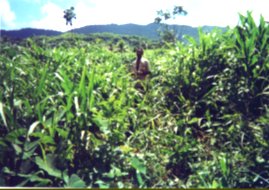PLEC JAMAICA | |||||
|
| |||||
Introduction The PLEC team The PLEC teamThe Jamaica PLEC team has been comprised of scientists and postgraduate student members, principally in the Environmental Management Unit of the Department of Geography and Geology, University of the West Indies. Associate members have been based in other departments of the University as well as in public sector agencies involved with environmental, agricultural or community development issues. The PLEC Demonstration Site The Demonstration Site is located in the lower valley of the Rio Grande, in Jamaica's northeastern parish of Portland and includes five communities - Fellowship, Tom's Hope, Stanton Harcourt, Berridale and Golden Vale, together comprising a population of 1,023 people. The social dynamics within and between communities are complex and influence the potential effectiveness of any efforts in the transfer of knowledge among the population. The Rio Grande watershed is characterized by high elevations, steep slopes and high rainfall. Humidity varies with elevation but is everywhere high. The valley is characterized by the richness of its biological diversity and the location of a number of indigenous species. The watershed is generally under tropical rainforest and the valley dominated by small farming, which is mostly mixed farming for the domestic market and household consumption, and bananas the main crop for export. The loam, sand and gravel soils are among the most productive for agriculture in Jamaica. However, fluctuations in the market for the major crops cultivated, traditionally bananas for export, provide a weak economic base for small farmers. Besides, the agro-ecosystem is vulnerable, being prone to flood and landslide hazards, high levels of soil loss and land degradation. Farmers suffer regular losses resulting from these events. PLEC activities PLEC project activities have included the characterization of the landscape in the context of diversity both of farm management and biodiversity cover. Expert farmers were selected and a series of community meetings and farm-based work-days arranged with expert and collaborating farmers. Other activities have included meetings with external stakeholders, including agricultural agents and policy-makers. The combination of activities overall have brought about a process of change that has taken various forms. The overarching achievement has been the acceptance by the expert and collaborating farmers, of a new paradigm for the dissemination of knowledge based upon a process of two-way exchange rather than instruction always coming from outside the community. It is further based upon the building of social capital based on networks that have developed through the PLEC activities. The implications of the PLEC activities
These relate to the farmers at the demonstration site as well as to the PLEC researchers themselves.
The farmers gradually recognized that the PLEC demonstration activities did not follow the usual uni-directional flow of information from external agent to farmer/community. The farmers therefore came to recognize that they themselves had valuable knowledge in terms of agricultural and environmental management. Besides, not only has the knowledge flow occurred between farmer and scientist in a two-way direction, but it has also occurred between farmers and other farmers. Future activities propose the transfer of knowledge and practice relating to agrodiversity from farmers to other members of their communities.
The research team came to appreciate that the specifics of the relationships and the process are unique to each group and therefore are different from one demonstration site to another - even within the same region or country. There is no template or fixed model for the successful transfer of knowledge at a demonstration site, except that both agricultural practices and social relations must be considered in facilitating the process of agrodiversity knowledge transfer. The way in which the process unfolds is always tentative. The researchers must therefore be led by the specific dynamics of each demonstration site in which they may work. Dissemination of the methodology and sustainability of the process Not only has the PLEC activity included (and will continue to pursue) meetings with agencies involved in community development and agricultural projects, but the PLEC student members have moved on to positions in national and international agencies where they will be in positions of influence. To ensure the sustainability of the process that has begun, follow-up work at the demonstration site and with the other stakeholders is needed, both to facilitate additional mechanisms for communication between farmer and the wider community of farmers and others, including children and young persons. Further dissemination of the PLEC methodology will be required to effectively alter practice at the official level.
(List of Publication)
|
 A further important implication of the PLEC activities has been the development of collaborative experimentation on the farms of the expert farmers, with farmers discussing strategies and outcomes of the experiments.
A further important implication of the PLEC activities has been the development of collaborative experimentation on the farms of the expert farmers, with farmers discussing strategies and outcomes of the experiments.